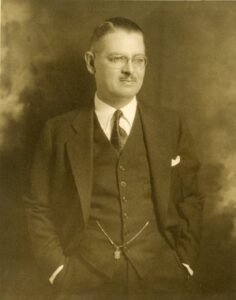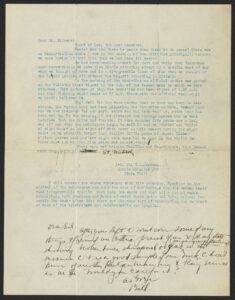November 11, 2018 is Veterans Day and marks the 100th anniversary of the Armistice that ended World War I. To commemorate this centennial, What Exit? will be featuring letters from Special Collections and University Archives’ Records of the Rutgers College War Service Bureau. This collection features letters from Rutgers students and alumni who served in the First World War, describing their experiences serving in the United States and overseas. Each day between November 1 and 11, Voices of the Armistice posts will share what these Rutgers students from 100 years ago had to say about the moment when peace was declared.

On November 11, 1918 William Herman, class of 1912 was serving with a Mobile Hospital unit in France. When the War Service Bureau inquired about his experiences when peace was declared, he responded:
“Peace? How can there be peace when there is no peace? There was no demonstration where I was on the morning of the armistice principally because we were busier at the time than we had been for weeks. . .
On the morning of the armistice an official notice was posted on the bulletin board signed by the C.O. of the second army to which we were attached. This informed us that the armistice had been signed at 5:30 A.M. and that fighting would ceace [sic] at 11 A.M. Even with the official seal on it we hardly believed it.
Why? Well for the same reason that we were too busy to celebrate. The second army had been preparing for its drive on Metz. We knew that and we had prepared for our part, extra men had been sent us, extra beds had been set up. On the morning of the eleventh the barrage opened and we were informed that the drive had started. It sure sounded like peace was a long way off and when the ambulances began to toll in and we started our shifts of eight hours on and eight off with never an idle moment during the eight hours on we promptly forgot that foolish little peace [sic] of paper. Eleven o’clock proved headquarters right once more but we kept up the shift for three days and by that time peace was an old story.”

Herrman was a doctor specializing in radiology. He died in 1965.
The Rutgers War Service Bureau was formed in 1917 as a way to keep Rutgers men serving in the war in touch with Rutgers and each other. It was headed by Earl Reed Silvers (class of 1913), who was assistant to Rutgers president William Henry Steele Demarest. Thanks to a grant from the New Jersey Historical Commission, the letters are now available online.
Be sure to visit What Exit? between November 1 and 11 for new stories and follow highlights on Special Collections and University Archives’ Facebook and Twitter.
(With assistance from Tara Maharjan. Herrman photo from the Rutgers University Biographical Files: Alumni Collection.)